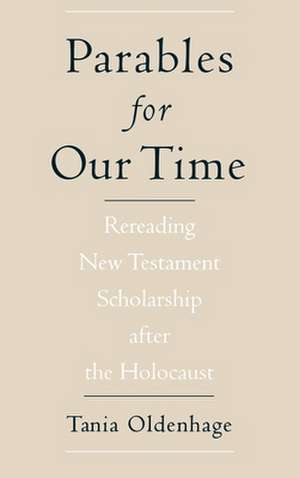Parables for Our Time: Rereading New Testament Scholarship after the Holocaust: AAR Cultural Criticism Series
Autor Tania Oldenhageen Limba Engleză Hardback – 16 mai 2002
Preț: 442.85 lei
Preț vechi: 612.14 lei
-28% Nou
Puncte Express: 664
Preț estimativ în valută:
84.74€ • 90.62$ • 70.65£
84.74€ • 90.62$ • 70.65£
Carte tipărită la comandă
Livrare economică 07-12 aprilie
Preluare comenzi: 021 569.72.76
Specificații
ISBN-13: 9780195150520
ISBN-10: 019515052X
Pagini: 200
Dimensiuni: 152 x 229 x 16 mm
Greutate: 0.47 kg
Editura: Oxford University Press
Colecția OUP USA
Seria AAR Cultural Criticism Series
Locul publicării:New York, United States
ISBN-10: 019515052X
Pagini: 200
Dimensiuni: 152 x 229 x 16 mm
Greutate: 0.47 kg
Editura: Oxford University Press
Colecția OUP USA
Seria AAR Cultural Criticism Series
Locul publicării:New York, United States
Recenzii
... very readable ... Without being denunciatory, this book provides a continuing critique of NT scholarship that exposes how radically speechless science is in the face of past and present politics.
... an unusually rich present to all who are engaged in NT work ... Oldenhage's book is unusual, valuable, and challenging.
The book is addressed to scholars and students alike, providing a sound overview of hermeneutical developments as well as offering an approach that can be explored further in scholarly works and the classroom ... an interesting book.
... an unusually rich present to all who are engaged in NT work ... Oldenhage's book is unusual, valuable, and challenging.
The book is addressed to scholars and students alike, providing a sound overview of hermeneutical developments as well as offering an approach that can be explored further in scholarly works and the classroom ... an interesting book.
Notă biografică
Tania Oldenhage is Assistant Professor of Religion at Mount Union College, in Alliance, Ohio. A native of Germany, she studied Protestant theology at the Universities of Heidelberg, Marburg, and Hamburg. She received her Ph.D. from Temple University.










